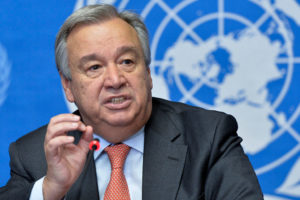Guyana welcomes the decision of the Secretary-General (SG) of the United Nations (UN) to refer the controversy between Guyana and Venezuela to the International Court of Justice (ICJ).

Antonio Guterres
This is according to Foreign Affairs Minister Carl Greenidge, who in a released statement said that “Guyana has always held the view that the ICJ is the appropriate forum for the peaceful and definitive settlement of the controversy, and is pleased that that view has prevailed under the process developed by both Secretary General Ban Ki-Moon and Secretary General Antonio Guterres.”
Moreover, he posited that Guyana “will not allow factors extraneous to the controversy to influence its referral to the Court, but it will continue the advancement of peaceful relations with Venezuela whose people are the brothers and sisters of Guyanese. In this context, Guyana acknowledges the Secretary-General’s suggestions for the immediate future.”
“That Guyana has stood firm against Venezuela’s attempt to re-open a territorial boundary settled and recognised for half a century before its independence, and done so despite the manifest unequal strengths between the two countries, is to our national credit. Guyana, as one of the world’s small developing countries, is pleased that its reliance on the rule of law internationally has been the underpinning of its national sovereignty” said Greendige.
Through the SG’s personal representative, Norwegian diplomat Dag Nylander, Guyana and Venezuela concluded another round of discussions in November 2017. Nylander had to submit his reports on the talks to the SG at the end of December 2017 before a decision is handed down.
The decades old controversy between the neighbouring countries began in 1962 when Venezuela claimed that the 1899 Arbitral Award, which established the Guyana-Venezuela border, is null and void.
Relations between Guyana and Venezuela have worsened ever since oil giant ExxonMobil announced in 2015 that it has found oil in Guyana. Venezuela has staunchly been against oil exploration in Guyana’s Stabroek Block, where ExxonMobil found multiple oil deposits.
In fact, Venezuela’s National Assembly had approved an agreement to reject the oil exploration activities in March 2017.
Venezuela, with almost 40 times the population of Guyana and a territory that is several times bigger, claimed in 1968 the entire territorial sea of Guyana by means of the Leoni Decree, which has never been withdrawn.
In 2015, the Government of Guyana requested then UN Secretary-General Ban Ki-moon to take steps towards resolving the controversy. In 2016, because of a stalemate on the matter, the outgoing Ban Ki-moon agreed with his successor, Guterres, to continue to use the Good Offices Process until the end of 2017 as a means of arriving at a settlement.
It is with this intention that Guterres appointed Nylander as an envoy to resolve the border controversy. According to the mandate of the Personal Representative, “If, by the end of 2017, the Secretary-General concludes that no significant progress has been made towards arriving at a full agreement for the solution of the controversy, he will choose the International Court of Justice as the next means of settlement, unless the Governments of Guyana and Venezuela jointly request that he refrain from doing so.”
Guyana has maintained that the only way to settle the controversy is by way of a juridical settlement at the ICJ.



